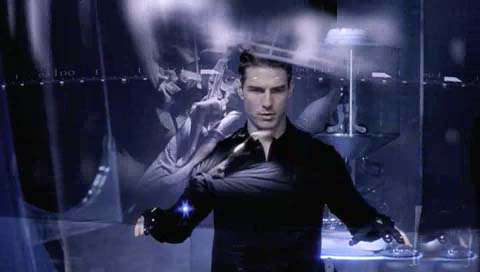After watching Minority Report last night, I was surprised to discover that most critics do not consider it to be an utter and complete piece of crap. Roger Ebert, in particular, had an absolutely gushing review, in which he praised the film for being “a thriller and a human story, a movie of ideas that’s also a whodunit.”
Ebert is by all accounts a lovely human being, but every time I read something by him, I am reminded that he does not have the critical sense that God gave a roach. Even an insect that frolics in filth would be hard pressed to find any enjoyment in such a shiny, treacly, turkey of a film. Spielberg as director has found perhaps the perfect outlet for his glibness in this tale of precognitive saviors. The film grinds frictionlessly along, a remorselessly predictable blueprint for itself. Flawed hero, tragic backstory, clever chase scene, cleverer chase scene, cleverest chase scene, false antagonist, twist, real antagonist, reconciliation with perfectly domestic yet also spunky wife. Like the precogs, we can see it all coming and all going too; painful echoes of sentiment past sliding down our brainstems as we float weightlessly in an infinite vat of sentimental horseshit.
The emotional core of the film is (you could predict it) the tragic backstory I mentioned. John Anderton (Tom Cruise) is a efficient no-nonsense police guy in the precrime unit, snooping out murders before they happen. Beneath his gruff exterior and Hollywood good looks, though, lurks a sadness; his 5-year old disappeared from a public pool. Anderton’s marriage collapsed, and now he takes drugs (ooooh…dark) and watches 3-D home movies of his son and wife. His heart is tugged while watching them and our heart is tugged while watching him; it’s a testament to the power of film and to “complex human feelings”, in Ebert’s words.
Said complex human feelings being: hey, losing a kid — that really sucks. If that happens to you, you’ve got to be deep, right? That is the extent of the film’s character development; Anderton has no other discernible personality traits; nor does his wife. The film’s stupid, by-the-numbers plot, it’s utterly facile and familiar characters, are all supposed to be redeemed by dropping a murdered five-year old onto them from a great height.
Before I had a kid myself, I found this sort of mindless, self-serving manipulation unpleasant. Now that I have a child of my own, who is actually a person rather than a trope, I find it even more detestable. At the end of the film, Anderton indignantly yells at his stupid standard-issue corrupt boss for manipulating his love for his child. Rarely have I seen a moment of such utterly clueless hypocrisy. The whole film is nothing but a giant machine designed to turn unearned pathos into critical bona fides. The closing scene with Anderton, where reunited with his now pregnant wife he touches her stomach, is a blindingly offensive capstone to a thoroughly offensive film, a smug reassuring happy-ending which obligatorily replaces one blank child-marker with another. The kids are just there to make us interested in the utterly uninteresting “star”; a dead child for motivation in the bulk of the story; a live one to wrap things up neatly. What could be wrong with that?
It hardly seems worth mentioning, but the movie looks dreadful too — all smooth lines and computer graphics, a future as streamlined Disneyland, where even the poverty and grime look like part of an amusement park ride, and cops invade everyone’s civil liberties with cute animated spiders that make you wish you could get warrantless retinal scans too. Maybe the precogs could foresee a worse filmmaker than Steven Spielberg sometime in the far future, but right now, as far as I’m concerned, he’s got no challengers.

